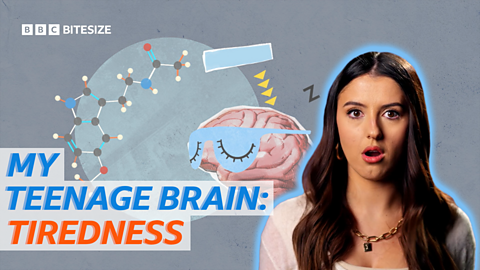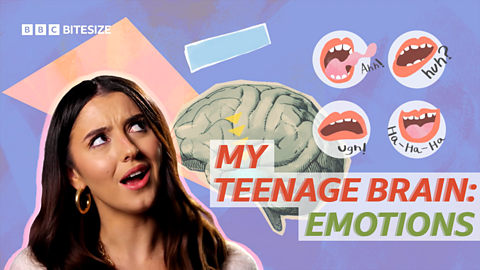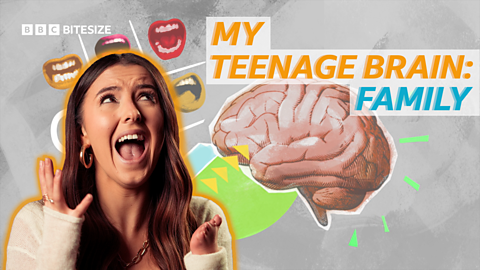India Sasha tells us how dopamine can lead to us getting stuck in a scrolling cycle.
India: Do you ever go to check one thing on your phone and next thing you know you've been scrolling for like half an hour, or maybe even hours?
So there is this chemical that our bodies makes called dopamine and the right amount of dopamine can make us feel amazing and it gives us the motivation to go out and and make things happen for ourselves.
Dopamine is released by our brains naturally at different times like when we eat, like when we're with our friends.
Obviously I love social media. It helps me keep in touch with people and most importantly for me it makes me laugh. So like lots of people when I scroll I get a little release of dopamine and that makes me feel good so I swipe again and again.
Before I know it I've ended up staying on my phone for ages missing out on doing things like eating, exercising, meeting people in real life. Sound familiar?
When we're scrolling we're exposed to so many different things on this tiny little device and it's a lot for our brains to process all at once. It's not an easy habit for anyone to break, especially not when you're a teenager because the rational, thinking and planning parts of your brain are still developing.
But we've got some tips and advice below which could help you out, so check it out!
Have you ever wondered why you might sometimes open social media, intending to quickly check, but end up stuck in a scrolling loop for ages?
Psychologist Dr Glenn Mason explains how the hormone dopamine, which is linked to pleasure, satisfaction and motivation, can be triggered by scrolling and that this is one reason why it can be difficult to stop when you start.
Watch the video below to learn more about how the brain can get stuck in a scrolling loop, then read some advice and helpful tips from Glenn.
Ever wondered why you can't stop scrolling on social media?
Media is all around us, and there's a lot of information to process on various social media platforms. This can be really fun and enjoyable, but if you’re worried about relying too much on social media, try using Glenn’s ABC method to break the habit.
What is the ABC method?
The ABC method is a way for you to recognise and adjust your social media habits.
A - Acceptance
Recognising that you can’t stop scrolling and wanting to address the problem is a great first step!
B – Behaviours
Try to understand your use of social media. You can track your screen time on most phones – take a look and see if you can recognise any patterns. What was happening before you went onto social media? Was there something that triggered it, like negative thoughts or distressing emotions?
C – Commitment
Set yourself some gentle goals that are important for you – how could less time on social media help you, and what could motivate you to achieve this? Change is difficult, so don’t be too hard on yourself if you don’t meet all of your goals straight away.
Three important things to understand about scrolling
Glenn explains that…
If you try to reduce your social media usage and can’t, this could be a sign that you’ve developed a habit. Other signs are if you’re finding yourself online for long periods, are using it to try and distract yourself from problems or difficulties in your life or if you’re spending significant amounts of time thinking about going back online.
An initial step to help is to keep a diary/log of how long you’re spending online, so that you know your baseline and can improve from there. You can also speak to a parent or caregiver, teacher, youth worker or your GP to reach out for help.
If you find yourself going online out of boredom, focus on developing hobbies and interests that are offline.
If you need support
You should always tell someone about the things you’re worried about. You can tell a friend, parent, guardian, teacher or another trusted adult. If you're struggling with your mental health, going to your GP can be a good place to start to find help. Your GP can let you know what support is available to you, suggest different types of treatment and offer regular check-ups to see how you’re doing.
If you’re in need of in-the-moment support you can contact , where you can speak to a counsellor. Their lines are open 24 hours a day, 7 days a week.
There are more links to helpful organisations on ±«Óătv Action Line.
You can find out more about the teenage brain here...
My Teenage Brain: Why am I so tired?
Feeling tired and you don't know why? Learn about why teenagers have a different sleeping pattern to others and get some advice on how to get better sleep.

My Teenage Brain: Why am I so emotional?
Do you ever feel like you're on an emotional rollercoaster? Learn about why your feelings might feel so intense and some top tips about helping manage your emotions.

My Teenage Brain: Why do I argue with my family?
Ever wondered why you might argue with your family more since becoming a teenager? You can learn more about family conflicts and gaining independence as a teen here!
